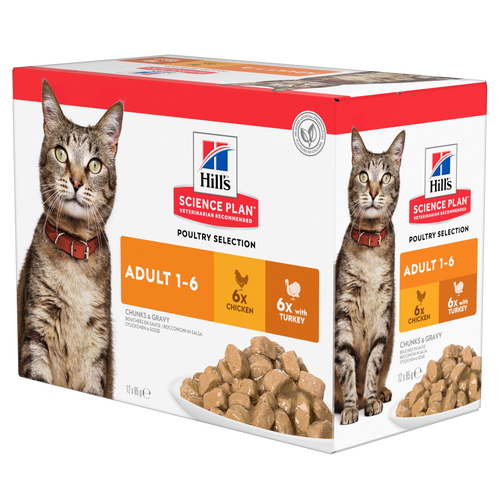
-
Find the right food for your petTake this quiz to see which food may be the best for your furry friend.Find the right food for your petTake this quiz to see which food may be the best for your furry friend.Featured products
 Sensitive Stomach & Skin Dog Food
Sensitive Stomach & Skin Dog FoodHill's Science Plan Sensitive Stomach & Skin Adult Wet Dog Food with Chicken is a complete premium dog food for adult dogs from 1 year. This savoury tinned loaf is enriched with ingredients that support digestive health & skin care.
Shop Now Perfect Weight Small & Mini Adult Dog Food
Perfect Weight Small & Mini Adult Dog FoodHill's Science Plan Adult Small & Mini Dog Food with Turkey is a complete premium pet food for adult small dogs from 1 year old that are prone to weight gain or slightly overweight. This deliciously smooth mousse is formulated to deliver the appropriate amount of energy to support weight maintenance in adult dogs.
Shop Now Perfect Digestion Small & Mini Adult Dog Food
Perfect Digestion Small & Mini Adult Dog FoodHill's Science Plan Perfect Digestion Small & Mini Adult Dog Food with Turkey is a complete premium pet food for small breed adult dogs aged 1–6 years. This deliciously smooth mousse is precisely balanced to deliver the appropriate amount of energy and to support digestive health in adult, small breed dogs.
Shop NowFeatured products Sensitive Stomach & Skin Adult Cat Food
Sensitive Stomach & Skin Adult Cat FoodHill's Science Plan Sensitive Stomach & Skin Adult Wet Cat Food with Turkey is a complete pet food for adult cats, aged 1–6 years. This highly digestible wet food comes in a pouch and supports healthy digestion, as well as nourishes skin and promotes a thick and lustrous coat.
Shop Now Sterilised Adult Cat Food
Sterilised Adult Cat FoodHill's Science Plan Adult Sterilised Cat Dry Food with Salmon is specially formulated with ActivBiome+ Multi-Benefit Technology. It is a precisely balanced nutrition, tailored to meet the needs of sterilised cats, to help keep them lean & healthy.
Shop Now Hairball & Perfect Coat Adult Dry Cat Food with Chicken
Hairball & Perfect Coat Adult Dry Cat Food with ChickenHill's Science Plan Hairball & Perfect Coat Adult Cat Food with Chicken is formulated to effectively help avoid hairball formation in adult cats while promoting a beautiful coat. Thanks to its mix of essential omega-6 fatty acids, this food benefits the cat's skin and fur, keeping them healthy and shiny. Our Advanced Fibre Technology helps reduce hairballs by naturally promoting their passage through the gut. This food is formulated with high-quality protein for a perfectly balanced, great-tasting recipe.
Shop Now -
Dog
- Dog Tips & Articles
-
Health Category
- Weight
- Food & Environmental Sensitivities
- Urinary
- Digestive
- Joint
- Kidney
-
Life Stage
- Puppy Nutrition
- Adult Nutrition
- Senior Nutrition
Cat- Cat Tips & Articles
-
Health Category
- Weight
- Skin & Food Sensitivities
- Urinary
- Digestive
- Kidney
-
Life Stage
- Kitten Nutrition
- Adult Nutrition
Featured articles The Right Diet For Your Pet
The Right Diet For Your PetIn people, the right diet is very important. If you are eating the wrong way for your metabolism, activity level, age and lifestyle you could end up with health issues.
Read More Show some love with wet foods: a great choice for pets with health issues
Show some love with wet foods: a great choice for pets with health issuesShow some love with wet foods: a great choice for pets with health issues.
Read More The Incredible Science Behind Your Pet's Microbiome
The Incredible Science Behind Your Pet's MicrobiomeLearn what your pet's microbiome is, how it contributes to your pet's gut and overall health, and why nutrition is important in maintaining healthy microbiomes.
Read More -


If your cat or dog is constantly itchy and scratching it can be very upsetting for you as well as your pet. We all know how annoying it can be to feel itchy and so we can easily empathise. I’ve seen lots of owners over the years having nights of broken sleep because all they can hear is scratching, licking and chewing. You might notice that your cat or dog is losing fur or has scabs and red patches. Although the cause of the itching might be something quite easy to sort out, the simple act of scratching can make the skin more inflamed and the trauma can lead to deep skin infections. This turns into a vicious circle of itching and scratching. Even if you think the itching is mild it’s better to get a vet check sooner rather than later to nip it in the bud.
You may worry that your pet has a food allergy or atopy but there are more common causes of itching that should be ruled out first. We’re going to start with a word that lots of people don’t want to hear - fleas!
Fleas.
The very mention of fleas makes many an owner immediately tell their vet that they are absolutely positive the pet does not have fleas, they have never seen a flea and that the animal is completely treated for fleas. This may well be true but in the vast majority of cases fleas are still the cause, and here’s why. Fleas spend most of their life in your soft furnishings - carpets, sofas, beds and so on. They hop onto your dog or cat when they want to feed so unless your pet has many fleas you may well never see one. In fact, for every flea that you see on your pet there are around 100 in your house! Gross, right?! You may have treated your cat or dog for fleas but the efficacy of this is very variable depending on what you’ve used and also how recently. Some animals are very sensitive to flea bites or may even be allergic, and need treatment with a good product very exactly following the recommended intervals.
A good way to know if your pet has fleas is to comb their fur onto a white piece of kitchen paper. If you see dirt come out, wet the paper. If the dirt turns the wet paper red then it is flea dirt or flea faeces. It goes red because flea poo is basically blood. Fleas love to hang out round the tail and rear end and round the neck too so if your pet has bald patches or scabs mostly in these places it’s REALLY likely to be fleas. The good news is that fleas can be easily got rid of and your vet will tell you how best to do it.


Tasty Tips
Young pets may need several visits in their first year for vaccinations. Adult pets generally benefit from annual check-ups, while senior or special-needs pets might require more frequent visits.
Other parasites
Other parasites like mites and lice can also cause itching and fur loss. Depending on the parasite involved your vet may need to take fur samples or have your pet in to take scrapings of their skin to look for the parasites under the microscope.
Other skin conditions.
Yeast infections and some fungal diseases like ringworm can also cause itching or hair loss. Some animals have very greasy or dry skin and these can be more common in certain breeds.
Once all these things have been ruled out your vet may want to look into food and environmental allergies and may need to do further tests.
All together now.
All cases of itching, fur loss and trauma, need to be approached in a logical way to rule causes in or out. We also need to remember that your pet might have more than one skin condition at the same time. Your dog or cat might cope with a few flea bites, for example, with no problem but add in some mites and they tip over their threshold for itching. They could also have something different like a food reaction going on. Skin issues can be simple but some can require lengthy investigation and time and energy from you. During this time your vet may also advise that your pet has a special therapeutic food for a period of time. These foods help reduce the itching and promote skin healing. Be prepared for all the investigation needed, get help early on and be patient with your vet as they take a logical, planned approach to figuring out just what is going on and the best way to treat it.


One of our staff authors prepared this article for you
Related products


Tender chicken chunks in gravy for mature adult cats. Made with easy-to-digest ingredients, high-quality protein for lean muscle maintenance and antioxidant vitamins C+E for optimal health.

Tender chunks in gravy for cats, with high-quality protein to maintain lean muscle. With vitamin E and omega-3s & -6s for healthy skin and balanced minerals to support healthy vital organs.

Tender chicken chunks in gravy for cats, with L-carnitine and fewer calories for ideal weight management. Packed with high-quality protein, omega-6s, and vitamin E for shiny fur and healthy skin.
Related articles

Show some love with wet foods: a great choice for pets with health issues.

In people, the right diet is very important. If you are eating the wrong way for your metabolism, activity level, age and lifestyle you could end up with health issues.

Learn what your pet's microbiome is, how it contributes to your pet's gut and overall health, and why nutrition is important in maintaining healthy microbiomes.

To make a protein, amino acids are linked together in a long chain. The chain is then bundled into to a three-dimensional structure, like a tangled ball of yarn.

Put your pet on a diet without them knowing
Our low calorie formula helps you control your pet's weight. It's packed with high-quality protein for building lean muscles, and made with purposeful ingredients for a flavourful, nutritious meal. Clinically proven antioxidants, Vitamin C+E, help promote a healthy immune system.
Put your pet on a diet without them knowing
Our low calorie formula helps you control your pet's weight. It's packed with high-quality protein for building lean muscles, and made with purposeful ingredients for a flavourful, nutritious meal. Clinically proven antioxidants, Vitamin C+E, help promote a healthy immune system.

